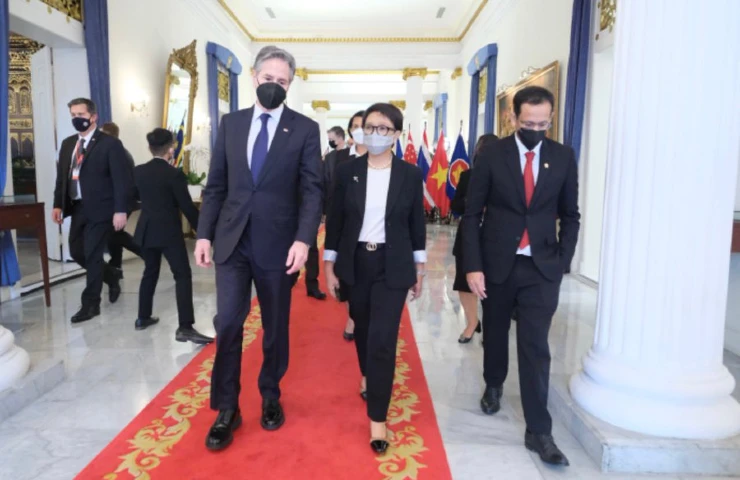On his south-east Asia tour, US secretary of state Antony Blinken has asserted that the US will strengthen military presence and develop economic relations with south-east Asian countries to counter China.
Under the stewardship of Joe Biden, who took over as the President in January, Washington has spent an entire year trying to wriggle back into a global vacuum created by previous president Donald Trump's inward-looking policies. US officials have traversed the globe reassuring governments that it can be depended upon against an aggressive China.
Warmly welcomed State Secretary Antony Blinken @SecBlinken to Gedung Pancasila this afternoon (14/12)
We reaffirmed our commitment to continue advancing Indonesia – US strategic partnership 🇮🇩🇺🇸 pic.twitter.com/v4zwRkQHT6
— Menteri Luar Negeri Republik Indonesia (@Menlu_RI) December 14, 2021
Blinken, who is on a three-nation trip to Indonesia, Malaysia and Thailand said that the Biden administration is keen on maintaining peace and prosperity in the region by boosting alliances, forging new relationships and ensuring that the US military maintains “its competitive edge.”
Baladas Ghoshal, former Professor and Chair in South & Southeast Asian Studies, Jawaharlal Nehru University, told India Narrative that despite Biden's assurances, the path for Washington-Jakarta relations will not be smooth. "Indonesia was left out by the US during Donald Trump's reign. In fact the Indonesians had noticed that Blinken and visited India and other countries in the region but not Indonesia".
Ghoshal said: "The US will have to walk the talk now". He added that on the other hand, the Indonesia Foreign Minister has been positive about relations with Washington even though the country's civil society has been critical about the US role in the region.
Read Also: Blinken on south-east Asia tour assures allies and urges China to restrain itself
Significantly, Indonesian Foreign Minister Retno Marsudi said in an official statement that the US is Indonesia's strategic partner. Marsudi said: "Both countries have many shared values which is believed to strengthen our concrete strategic partnership. For instance, democracy is one of the values shared by the two countries".
Significantly, the two countries also signed an agreement–Extension of Maritime Cooperation.
Marsudi said: "This MoU covers, among others, maritime security cooperation, marine resources, conservation and fisheries management as well as maritime safety and navigation. In order to strengthen our security cooperation we agreed to establish a 2+2 dialogue mechanism between senior officials from each ministries of foreign affairs and ministries of defence".
Indonesia has been the first stop for Blinken, where he has been able to demonstrate American prowess and commitment in the fields of defence, trade, diplomacy and importantly even in the joint development of vaccines.
Giving an insight into Washington's mind, Blinken said: “We'll adopt a strategy that more closely weaves together all our instruments of national power — diplomacy, military, intelligence — with those of our allies and partners".
Blinken added that the US strategy in the region includes linking US and Asian defence industries, integrating supply chains and cooperating on technological innovation.
All this in an effort to counterbalance a demanding and assertive China.




















